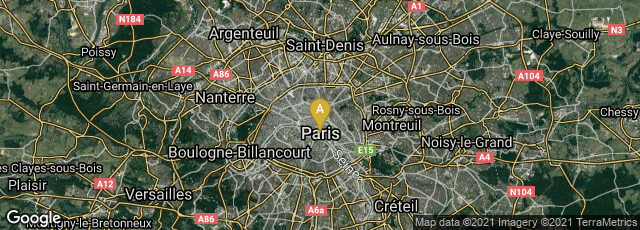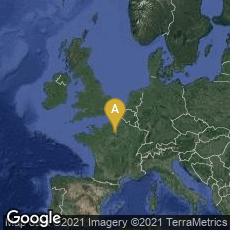

A: Paris, Île-de-France, France
French physician, philanthropist and journalist Théophraste Renaudot organized a series of weekly public conferences on diverse subjects, including science, called Conférences du Bureau d'Adresse. These were published by the Bureau d'Adresse as Questions traitées ès Conferences du Bureau d'Adresse (5 volumes, 1633-1641).
In 1630 Renaudot founded the Bureau d'Adresse in Paris.
"The Bureau was basically an employment agency combined with an outpatient clinic. Whoever registered there (for 0 to 3 sous, according to his means) received free medical treatment and help in finding jobs, cheap clothing, lodging, and furniture. The Bureau also granted its clients small-scale credits on security and helped them in their dealings with government offices and the law. It kept a card index of people looking for service or offering help. It also kept a current price index. Gradually it branched out into an advertising agency, a travel agency, a messenger service, a horse rental and shop where almost everything could be bought or hired: curios, antiques, domestic animals, houses, estates, geneologies, the services of private tutors, funerals. . . . The Bureau arranged marriages, recruited soldiers, found monks for understaffed monasteries and even planned to deal in academic degrees.
"This traffic in goods and services naturally also involved the traffic in information. With clients from all walks of life and through a network of correspondents the Bureau systematically collected news from home and abroad, which proved very valuable to the government. Indeed this was the main reason for the continuing protection which it received from Père Joseph and Cardinal Richelieu. They not only skimmed off its information, they also used it to influence public opinion. . . .
"Renaudot also made the Bureau into a centre of intellectual life. From 1633 on, he organized weekly 'conferences' in its rooms... [at the sign of the Great Cock (Grand Coq) on rue de la Calandre on the Ile de la Cité]. As in the earlier Renaissance academies, quaestiones were put up for discussion at these meetings which triggered the exchange of opinions, but were not decided by empirical research. . . In other respects these 'conferences' were looking towards the scientific societies of the second half of the 17th century; the discussions were held in the vernacular (French, not Latin); it was forbidden to quote 'authorities'; religious and political topics had to be avoided. Occasionally even experiments wer performed in order to demonstrate some point of discussion. In 1640 Renaudot set up a chemical laboratory. Yet his main interest was not pure science, but its humanitarian and pedagogic application. According to Renaudot's philanthropic principles, the 'conferences' were open to everybody who cared and consequently were not considered to be very prestigious among the intellectual élite" (Stagl, A History of Curiosity [1995] 136-37).
Renaudot's weekly conferences bear some comparison to those of the Invisible College, which preceded the Royal Society; however, they were attended by a considerably larger audience, were much closer to popular science in their orientation, and their speakers remained anonymous in the published reports.
The Conférences predate the Journal des sçavans and the Philosophical Transactions by 30 years. They were collected in book form rather than published as a periodical, and were published in English translation in 1664-65, just as the Royal Society was being formed.